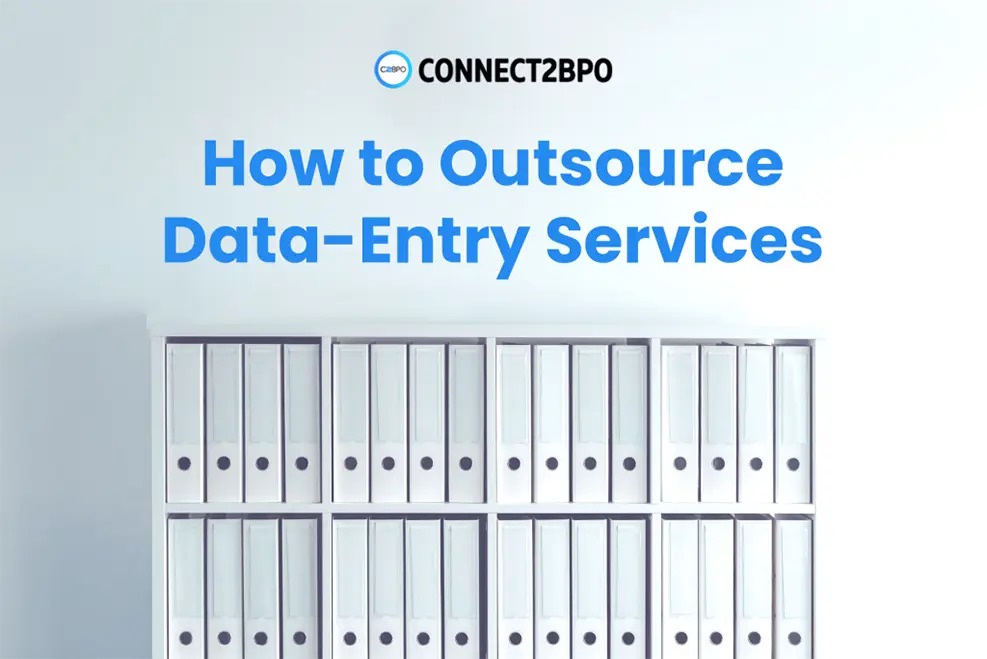In today’s rapidly evolving business landscape, efficiency and accuracy are paramount for success. Effective data management becomes increasingly critical as businesses accumulate vast amounts of data.
Data entry, a fundamental aspect of data management, involves the inputting and processing of various types of information into digital formats. However, this task can be time-consuming and labor-intensive, diverting valuable resources away from core business activities. That’s why outsource data entry is a very common
Fortunately, outsourcing data entry services has emerged as a viable solution to streamline operations, reduce costs, and improve productivity; Connect2BPO offers this service as part of its portfolio of back-office solutions. This comprehensive guide explores the ins and outs of data entry outsourcing, including its services, benefits and opportunities for remote working.
Are you looking for human talent for your company? We select and hire them for you. Focus on your operation and achievements. Check RPO: Recruitment Process Outsourcing
What Are Outsourced Data Entry Services?
Outsourced data entry services encompass a wide range of tasks aimed at organizing, managing, and processing data efficiently. These services are tailored to meet the specific needs of businesses across diverse industries. Here are some common types of data entry outsourcing services:
CRM Data Entry and Data Mining: Customer Relationship Management (CRM) data entry involves inputting customer information, interactions, and transactions into CRM software systems. Data mining entails extracting valuable insights and patterns from large datasets to support strategic decision-making processes.
Claims Data Entry: Insurance companies often outsource claims data entry to accurately record and process insurance claims, including policy details, coverage information, and claims documentation.
Document Data Entry: Outsource data entry involves converting physical or digital documents, such as handwritten notes, forms, or invoices, into electronic formats. This includes transcription, data capture, and indexing to ensure easy access and retrieval of information.
ERP Data Entry: Enterprise Resource Planning (ERP) data entry focuses on entering and updating business-critical data into ERP systems, including financial transactions, inventory records, and procurement information.
E-Book Data Entry: E-book data entry involves digitizing content from printed books or manuscripts into electronic formats, such as eBooks or digital libraries. This includes scanning, OCR (Optical Character Recognition), and proofreading to ensure accuracy and readability.
Food Nutrition Scale Data Entry: Food nutrition scale data entry entails inputting nutritional information from food labels or databases into nutrition analysis software. This includes nutrient values, serving sizes, and ingredient lists to support dietary analysis and meal planning.
Insurance Data Entry: Insurance outsource data entry involves capturing and processing various insurance-related information, including policyholder details, claims data, and underwriting documentation. This ensures accurate record-keeping and efficient claims processing. Connect2BPO has enough experience in the Insurance field (data entry, payroll, and customer service).
Invoice Data Entry: Invoice data entry involves inputting invoice details, such as billing information, item descriptions, quantities, and prices, into accounting software or databases. This facilitates accurate billing, financial reporting, and payment processing.
Image Data Entry: Image data entry involves extracting text, metadata, or other relevant information from images or scanned documents. This includes data capture, image tagging, and metadata extraction to facilitate document management and searchability.
Medical Data Entry: Medical data entry focuses on accurately recording patient information, medical histories, diagnoses, treatments, and billing details into Electronic Health Records (EHR) or Practice Management Systems (PMS). This ensures compliance with regulatory requirements and facilitates efficient healthcare delivery.
Online Data Entry: Online data entry involves updating and maintaining online databases, forms, or content management systems with accurate and up-to-date information. This includes data validation, data cleansing, and content moderation to ensure data integrity and user satisfaction.
Offline Data Entry: Offline data entry entails transcribing handwritten or printed documents into electronic formats, such as spreadsheets, databases, or word processing documents. This includes data entry, verification, and quality assurance to ensure accuracy and completeness.
Property Preservation Data Entry: Property preservation data entry involves managing property-related information, such as maintenance records, inspection reports, and property valuations. This ensures compliance with property regulations and facilitates efficient property management.
QuickBooks Data Entry: QuickBooks data entry focuses on accurately recording financial transactions, such as sales, purchases, expenses, and payments, into QuickBooks accounting software. This ensures accurate financial reporting and compliance with accounting standards.
Real Estate Appraisal Data Entry: Real estate appraisal data entry involves inputting property valuation data, market analysis, and comparable sales information into appraisal software or databases. This supports real estate valuation and decision-making processes for buyers, sellers, and lenders.
Restaurant Menu Data Entry: Restaurant menu data entry entails updating menus with accurate pricing, descriptions, ingredients, and availability. This ensures consistency across online platforms, printed menus, and point-of-sale systems, enhancing customer experience and operational efficiency.
Real Estate Data Entry: Real estate data entry involves managing property listings, sales records, rental agreements, and client information for real estate agencies or property management companies. This ensures accurate property marketing, transaction management, and client communication.
Survey Data Entry: Survey data entry involves entering survey responses, questionnaires, or feedback into databases for analysis and reporting. This includes data validation, coding, and analysis to extract actionable insights and inform decision-making processes.

Outsource Data Entry: Benefits You Should Know
Outsourcing data entry offers numerous benefits for businesses seeking to optimize their operations and focus on core competencies. Some of the key advantages include:
Increased Productivity: Outsourcing data entry tasks frees up valuable time and resources, allowing businesses to focus on strategic initiatives and core business activities. This can lead to increased productivity and efficiency across the organization.
Cost-Effectiveness: Outsourcing data entry can result in significant cost savings compared to hiring and training in-house staff. By leveraging external service providers, businesses can access skilled labor at lower costs, without the overhead expenses associated with maintaining an in-house team.
Access to Specialized Expertise: Data entry service providers often have specialized skills, knowledge, and experience in handling various types of data entry tasks. This expertise ensures accuracy, efficiency, and quality in data processing, leading to better outcomes for businesses.
Scalability and Flexibility: Outsourcing data entry allows businesses to scale their operations up or down based on fluctuating demand and business requirements. This flexibility enables businesses to adapt quickly to changing market conditions and resource constraints.
Focus on Core Competencies: Outsourcing non-core activities such as data entry allows businesses to focus their time, energy, and resources on core competencies and strategic initiatives. This can lead to innovation, growth, and competitive advantage in the marketplace.
Risk Mitigation: Outsourcing data entry to reputable service providers can help mitigate risks associated with data security, compliance, and quality control. Service providers adhere to industry best practices, security standards, and regulatory requirements, reducing the risk of data breaches, errors, and compliance violations.
Improved Data Quality and Accuracy: Outsourcing data entry to skilled professionals ensures accuracy, consistency, and reliability in data processing. Service providers employ rigorous quality assurance measures, data validation techniques, and error-checking procedures to maintain data integrity and reliability.
24/7 Support and Coverage: Many outsourcing firms offer round-the-clock support and coverage, ensuring uninterrupted data entry services and support for global operations. This enables businesses to access timely and responsive assistance, regardless of time zones or geographic locations.
Enhanced Data Security and Confidentiality: Outsourcing data entry to reputable service providers ensures the confidentiality, integrity, and security of sensitive data. Service providers implement robust data security measures, encryption protocols, and access controls to safeguard confidential information and mitigate data risks.
Focus on Customer Satisfaction: Outsourcing data entry enables businesses to enhance customer satisfaction by delivering accurate, timely, and personalized services. This can lead to improved customer retention, loyalty, and brand reputation in the marketplace.
Data Entry Remote Jobs
The rise of remote work has opened up numerous opportunities for individuals seeking data entry jobs. Remote data entry jobs offer the flexibility to work from anywhere with an internet connection, making them ideal for freelancers, students, or individuals seeking work-life balance.
How to Get Remote Data Entry Jobs

Securing remote data entry jobs requires a combination of skills, preparation, and perseverance. Check how RPO (Recruitment Process Outsourcing) works. Here are some steps to help you kickstart your journey into the world of remote data entry:
- Polish Your Skills: Data entry requires precision, accuracy, and attention to detail. Ensure that your typing speed and accuracy are up to par, and familiarize yourself with common data entry software and tools.
- Build a Strong Resume: Highlight your relevant skills and experience in your resume, emphasizing any previous data entry or administrative roles you’ve held. Include any certifications or training programs related to data entry to bolster your credentials.
- Search for Remote Job Opportunities: Explore online job boards, freelance platforms, and remote job websites for data entry positions. Tailor your job search to focus on remote opportunities specifically, using keywords such as “remote data entry,” “virtual data entry,” or “work-from-home data entry.”
- Network and Connect: Leverage your professional network and connections to uncover hidden job opportunities or referrals. Join online communities, forums, or social media groups dedicated to remote work or data entry to expand your network and stay informed about potential job openings.
- Prepare for Interviews: Be prepared to showcase your skills and qualifications during remote interviews. Practice answering common interview questions related to data entry, and demonstrate your proficiency in relevant software tools or platforms.
- Stay Persistent: Securing a remote data entry job may take time and persistence. Don’t get discouraged by rejections or setbacks; continue refining your skills, networking, and applying for relevant positions until you land the right opportunity.
Benefits of Data Entry Jobs from Home
Working as a remote data entry professional offers a host of benefits that appeal to individuals seeking flexibility, convenience, and autonomy in their careers. Some of the key benefits include:
- Flexibility: Remote data entry jobs allow you to work from anywhere with an internet connection, giving you the freedom to create your own schedule and work environment.
- Work-Life Balance: Working from home eliminates the need for lengthy commutes and allows you to balance your professional and personal responsibilities more effectively.
- Cost Savings: Remote work eliminates expenses associated with commuting, professional attire, and dining out, resulting in potential cost savings for remote data entry professionals.
- Increased Productivity: Remote work often leads to higher levels of productivity, as individuals have fewer distractions and interruptions compared to traditional office environments.
- Access to a Global Job Market: Remote data entry jobs open up opportunities to work for companies and clients from around the world, expanding your job prospects and potential income streams.
- Professional Development: Remote data entry professionals have access to a wealth of online resources, training programs, and professional development opportunities to enhance their skills and advance their careers.
Are you ready to grow your business? Data Entry Services with Connect2BPO
In summary, outsourcing data entry services offers many benefits for businesses seeking to optimize their operations, reduce costs, and improve productivity. Whether it’s CRM data entry, document transcription, or online form processing, outsourcing allows businesses to leverage specialized expertise, scalable resources, and advanced technology to streamline data management processes.
Moreover, the rise of remote data entry jobs presents lucrative opportunities for individuals seeking flexible employment options in the digital age. By embracing outsourcing, businesses can unlock new efficiency, innovation, and competitiveness levels in today’s dynamic business environment.
Get in touch to find out how can we improve your business operations.
If you see potential in the trends above, book a call with Connect2BPO to discuss your ways forward.
C2BPO has trained its staff to not only adapt outsourcing trends but also to contextualize these according to their own markets.



